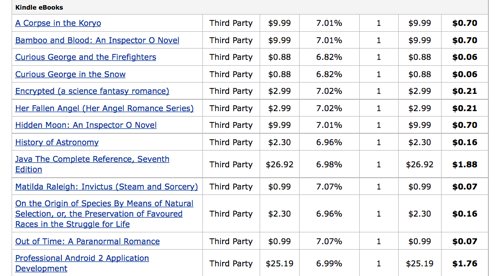Well, guys, I’m not famous yet, but I’m optimistic about the future of e-publishing and the future of my ebooks! If you’re popping in new, I published two novels and two collections of short stories in the last six weeks (the novels have only been up for four weeks for Emperor’s Edge and a week and a half for Encrypted). The novels are $2.99 and the story collections $0.99.
I’m amazed at how much I’ve learned and experimented with in just six weeks. Here are my results and some of what I’ve learned along the way….
Ebooks sold thus far:
- The Goblin Brothers Adventures (went live Dec. 10th) at $0.99: 65
- The Emperor’s Edge (went live Dec. 24th) at $2.99: 124
- Encrypted (went live Jan. 15th) at $2.99: 22
- Ice Cracker II (and Other Stories) (went live Jan. 15th — haven’t promoted it) at $0.99: 5
The grand total is 216 with Emperor’s Edge the clear leader.
These sales are from Amazon and Smashwords (I know there have been a few from Barnes & Noble this month, but their up-to-the-minute stats have been flaky for me, with sales appearing, then disappearing, so I’ll wait until the end of the month to figure those in). My ebooks aren’t in the iTunes store yet (brain fart there: Apple won’t accept ebooks without ISBNs, and Smashwords will provide them, but apparently you have to go into the Smashwords dashboard and actually add the free ISBNs to your cart and “check out” to have them assigned — I only recently did this), but I hope that will change soon.
I haven’t counted freebies given away via email or with Smashwords coupons. I’m sure “friends and relatives” account for around 20 of these sales, but the rest belong to the good ebook-reading folks of the internet.
All in all, these sales stats aren’t going to blow anyone away, but I feel it’s a good start. I’ve always known I’m not the aggressive marketer type (I’m definitely that shy introvert who doesn’t want to annoy anyone), so I’m happy with things so far. I’m also tickled with the positive reviews my ebooks have gotten thus far from folks, some of whom aren’t in my crit group or related to me (shocking, I know!)
Where the sales have come from:
Amazon, B&N, Smashwords, etc. don’t show you any details about how people found your books and made their purchases (i.e. which site or advertising campaign sent them), so there’s a lot of guessing involved here. I’m fairly confident these are in the ballpark though.
- My blogs (this one and Kindle Geeks) — In another brain fart, I didn’t add affiliate links until recently, so I don’t know how many sales originated from my blogs, but there have been a few since I started tracking. If I’d been smart and started these blogs long ago, they’d likely be more popular now and account for many more sales, but I wasn’t even thinking about e-publishing until early November.
- Advertising — I’ve written about my Kindle Nation Sponsorship Results, and I’ve also been running Goodreads campaigns for the last three weeks or so. That’s when I started going from 1 or less sales a day to 3 or more most days. I’ll do a post on running a Goodreads campaign, because you pay per click so it’d be easy to waste a lot of money if you weren’t careful. I make it clear in the actual ad that it’s an ebook so as to discourage people from clicking if they’re not ebook-reading peeps. Thus far I’ve spent less on advertising than I’ll make in royalties from these books, but it’ll be months before I make back the costs of cover art, editing, etc. That’s to be expected, though, and even if my sales just remain at the rate they’re at now, I’ll make back those initial expenses before summer is here.
- My free ebook, Ice Cracker II, which I uploaded to Smashwords and Feedbooks and which recently got listed as a freebie at B&N (via Smashwords distribution) — I haven’t spent any time promoting my novels at Smashwords, since it’s relatively unknown compared to the mainstream booksellers, so I believe all my sales (about 25) there are a result of this ebook. Unlike the $0.99 collection, it’s a single short story that stars the characters from The Emperor’s Edge. I included an excerpt from the novel at the end with links to encourage folks to go on and purchase the novel if they enjoyed the short story. I’m hoping it will continue to to be found in the months to come and will help introduce people to the series.
- Amazon — I’m sure some people have found my books by clicking “people who bought this bought this” or whatever that section is, but I don’t sell enough to appear in any bestsellers lists, so I doubt many of the sales are coming from internal searches yet.
- Honorable mention to guest blogging and article syndication — I don’t think these activities have directly sold many ebooks, but they build links to my blog, which increases my blog’s authority in the eyes of the search engines, which should bring me more traffic as the months and years go on, and which should increase the number of sales that originate here. (Don’t worry — I don’t use the word “which” that often when I write fiction.)
Where these sales haven’t come from:
The following are things that may help a little and may sell an ebook here and there, but I believe they are, given the time investment, relatively ineffective forms of marketing (though they may have benefits outside of book sales):
- Posting in forums — I’ve been on the Kindleboards, Nookboards, and MobileReads, and I know I’ve created some interest (in my free ebook in particular) from posting there, but it’s a huge time sink. As far as marketing goes, I believe that time would be better spent building up our blogs, writing articles and guest posts to increase links to said blogs, and writing more ebooks. If you like posting in forums and enjoy the social element, then by all means do so (I like to pop in from time to time, for sure!), but, in my opinion, this is a pretty poor marketing plan, especially when the forums are saturated with indie authors trying to sell books. Generally speaking, the easier something is, the more people will do it, and the less effective it will be as a method to stand out and get noticed.
- Twitter — Twitter isn’t a bad tool, but it’s more about networking than selling books. Now and then I’ll mention my books, but I’ve primarily used it to promote blog posts and meet fellow writers and bloggers, some of whom have allowed me to guest post on their sites. What Twitter isn’t is a Barnes & Noble store where people log in, looking to buy things. It’s more like a Starbucks. People are there to hang out and be social. I’ve not seen much evidence that people tweeting about their books ten times a day make many sales that way (I’m nosy, so I’ve checked the sales rankings of folks with 8,000 follows who tweet about their books day in and day out).
- Facebook — I don’t do much here, but it seems to be similar to Twitter. Useful for networking and building up blog popularity, but not really a platform for selling ebooks directly. (Feel free to disagree with me and leave comments if you’ve had other experiences — my “six weeks” of being an indie author certainly doesn’t make me an expert.)
My goals going forward:
- Write Book 2 (and 3 and 4 and more!) in the Emperor’s Edge series — My ebooks are all over the map right now. They don’t star the same characters, nor are they even in the same sub-genres of fantasy. In some ways this is good, because it lets me see which series has more potential to be popular and which I might want to focus on developing first, but if you make a fan of someone on a Book 1, they’ll likely go on to grab the following books in that series. It might be more up in the air with unrelated books.
- Get some reviews from review bloggers willing to look at indie ebook authors — I have submitted my ebooks to some of the sites out there, but it seems to be a months-long wait in many cases. That’s perfectly understandable, as I’m sure these reviewers are backlogged with requests.
- Participate in blog tours — I’ll write more about this later, but Encrypted and Emperor’s Edge are both going to appear on several blogs over the next two months. It’s kind of like getting the benefits of a guest post (links to your site/books) without having to write the post. The bloggers usually feature your book, and some may ask interview questions or even volunteer to review your book.
- Fix up this blog — This is a free theme I grabbed, and it could use some work. I finally added a contact form, but I need to add social media tags (so people can just click a button at the bottom of the post to Facebook/Tweet/Digg something) and fix some quirks.
- Start a newsletter — It’s sad that I haven’t gotten around to this yet. Having a mailing list means you can easily let your fans know about your new releases. Otherwise they just might forget about you in the time that passes between books. As the marketing pros say, it’s easier to sell again to an existing customer than acquire a new customer!
- Experiment with more advertising options — I’m going to purchase a banner ad on the Nookboards and a sponsored post on two fairly popular kindle-book-review blogs. My gut instinct is that I won’t earn back what I spend, because none of those sites are genre-specific, but I might be pleasantly surprised (I wasn’t expecting Goodreads to work at all, and it has; even if it’s just a small trickle, it’s earning more more than it costs for that trickle).
I’ve rambled on here more than I expected to, so I hope you’ve found something useful. At the least, thanks for your interest in my progress.


 A few people have stumbled across my site by searching for “best way to promote other people’s ebooks” or “how to make money reviewing books on a blog” so I’m guessing there’s some interest in the area. Since I’ve been making money through affiliate programs since 2003, I know a thing or two (maybe even three) about this.
A few people have stumbled across my site by searching for “best way to promote other people’s ebooks” or “how to make money reviewing books on a blog” so I’m guessing there’s some interest in the area. Since I’ve been making money through affiliate programs since 2003, I know a thing or two (maybe even three) about this.

 If you’ve read any articles on search engine optimization, then this will be a basic post for you, but if you’ve been hearing about keywords and seo and wondering what it means, then this may serve as a starting point.
If you’ve read any articles on search engine optimization, then this will be a basic post for you, but if you’ve been hearing about keywords and seo and wondering what it means, then this may serve as a starting point.




